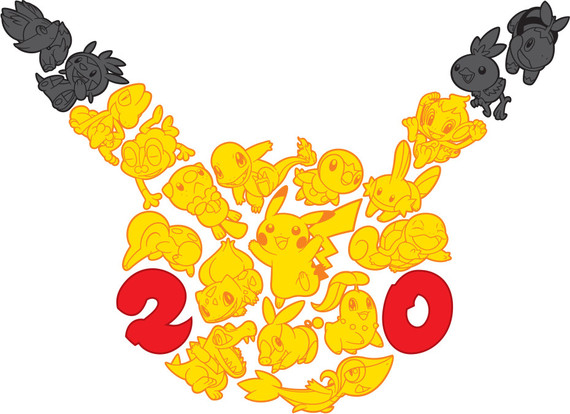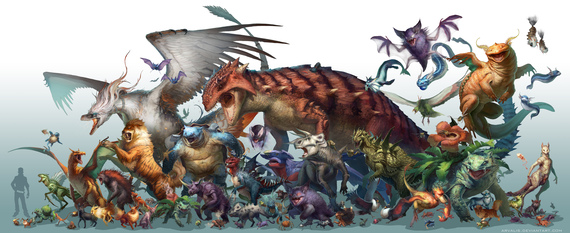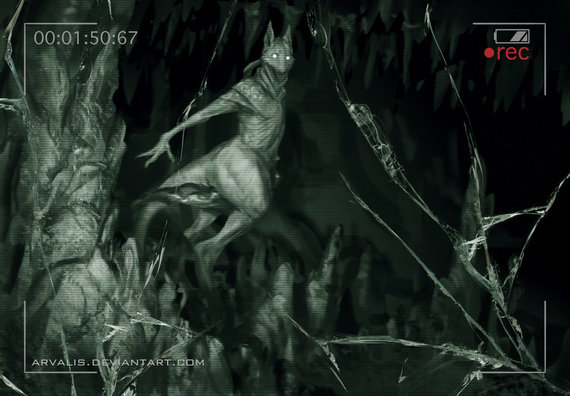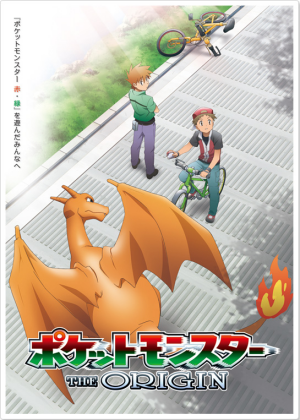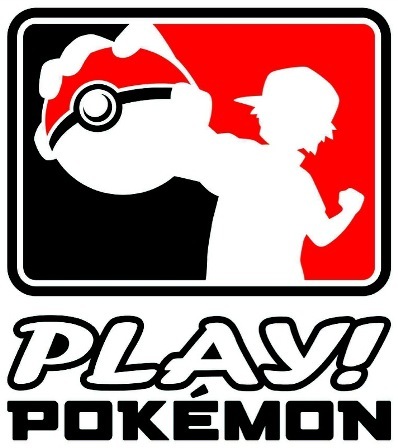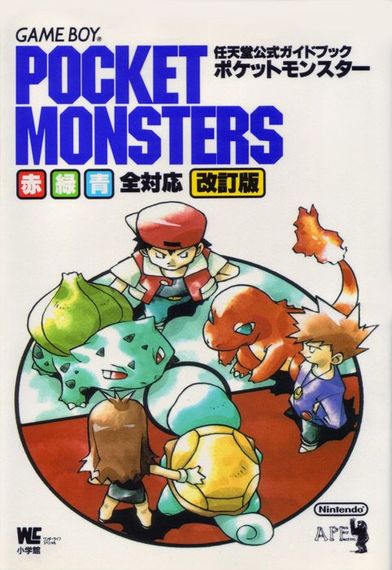In the early 2000s, reporters loved writing panic-fueled pieces about Pokémon. They nervously wondered if the Japanese media franchise was corrupting children by glorifying animal fighting, addicting them to Game Boys, or sending them Satanic messages through a cartoon theme song. Saudi Arabia even issued a fatwā against Pokémon. (And no, that isn't some Internet urban legend. It actually happened. You can Google it now; I'll wait.)
Granted, the accusations were nothing new to pop culture empires. The Beatles had been accused of similarly hysterical sins back in the 1960s. And while there was plenty of handwringing when we 90s children were in grade school, seldom has the impact of Pokémon on Millennials been written about by its demographic audience - Millennials. Yes, the generation that everybody loves to write juvenoia-based cover stories on. Some things never change, huh?
On the media franchise's 20th anniversary, I figured it was time to look back on the tiny game cartridges that later built a globe-spanning phenomenon. After being with Pokémon since its 1998 US-launch, I've seen it quietly mold the ideals of young people born between the early 1980s and 2000, and in a powerfully positive way. Our values, educational achievements, and even careers were influenced by that Game Boy title from twenty years ago. Pokémon has become a networking grease and, as Reddit user Aiyakiu described, social currency that holds together a substantial chunk of our generation. If the Reddit thread I used to harvest information for this article holds strong, "The Pokémon Effect" is something that's visibly altered our adult social dynamics, and we're profoundly grateful for that.
Every generation's ethics are influenced by the media they are exposed to. Our parents had Aerosmith, M*A*S*H, and A Clockwork Orange. But unlike the other 90s media giant, Harry Potter, Pokémon is a video game. It remains a new form of media that is still derailed as being produced exclusively for acne-ridden teenagers. Only in recent years have video games become legitimized as art, and even then, only in progressive circles. While I proudly flash my Hufflepuff lanyard each time I open my apartment door, there's no denying that Harry Potter books had a warmer welcome from parents and teachers alike. At least it was making children read, wasn't it? Pokémon was just addicting them to the Game Boy Color.
In actuality, Pokémon was also teaching children to read. Of the 169 comments collected on Reddit, 5% of them said the game had boosted literacy skills. Jarod Hine Country from Australia wrote: "Growing up, I had a severe aversion to school. I was behind in reading and mathematics. After getting into Pokémon, within a year, I had caught up to and surpassed the standard literacy and math level. By the time I was ten years old, I was reading at the twelfth grade level."
Four English language learners reported studying seriously so that they could discuss the franchise at their new, majority English-speaking schools. Another was inspired to overcome his speech impediment. The desire to game together was a powerful thing, and it spurred disinterested students to focus more on reading and language acquisition. (You can't evolve that Haunter until you learn how to ask for a trade first!) The overwhelming majority of stories collected mentioned that Pokémon had helped them form positive social relationships, either with family or new friends.
I also learned to read through Pokémon: Red Version. The words "parcel," "evade," "far-fetched," "rival," "elite," "leech," "amnesia," "agility," "swift," "psychic," "teleport," and "telekinesis" and would have been worthless to me without it. Long-time players will probably recognize those words from where they are placed in the original games' scripts. Any word I didn't recognize, I simply looked up in a fat Scholastic Dictionary for Children, and that made English prefixes a breeze by second grade. (Just a few Pokémon names that helped: "Aerodactyl," "Geodude," "Voltorb," and of course, the ever-popular attack, "hydro pump.") I imagine Reddit contributors also used these clues to acquire phonics skills.
But benefits for Millennials were not exclusively academic.
Comics, games, and cartoons are highly reflective of the culture that birthed them. As such, Pokémon clearly portrays the values prized in shōnen manga, or Japanese comics appealing mainly to young males. These values were a common theme in our Reddit thread, as well; dogged determination, grit (and above all else) reckless bravery are emphasized. Theme songs from the cartoons urge youngsters to follow a goal when everyone else would give up. As echoed in the first series opening: "I wanna be the very best, like no one ever was."
If you think that's a brash or arrogant attitude to have, you've got it. That's exactly what Giovanni, a gang boss and the main series antagonist, repeatedly tells a young trainer who foils his plans. Perhaps his role in Pokémon Origins encapsulates the franchise's Japanese shōnen values most effectively.
The first episode aired in 2013, and within its first ten minutes, we see that the protagonist, Red, is dogged, determined, and recklessly brave. Yet he simultaneously understands he needs to learn and grow. His rival, Blue, is different. As the professor who sends both of them out on their journey remarks: "Although he's clumsy, ever since he was a young boy, he's [Red's] hated to lose. But he is honest and he will learn from those around him and grow stronger. I believe he will make a good Pokémon trainer. I only hope Blue will grow along with Red. Unlike Red, he's too good, which makes him a little arrogant."
Juliet Powell, a young American, commented on this shōnen theme in her hard-hitting Reddit comment. "For a kid, battling Pokémon serves as a lesson in self-betterment," she said. "As a kid, I was pretty much a spoiled brat. If something didn't go my way, I'd just start sulking...but after playing some Pokémon, I quickly realized that getting upset and giving up doesn't solve anything. The game fuels you to do better...eventually, the way I was approaching Pokémon started to rub off into my daily life. Instead of running away from my problems, I 'used tackle' on them. I tried new things, and above all, I didn't quit...I honestly believe that I would not have gotten as far in life as I have today were it not for those crucial problem solving skills and the sense of dauntlessness that I gained from becoming a Pokémon player." And she isn't the only one who has absorbed the pursuit of excellence theme that is so prominent in the games.
The Pokémon fanbase itself is like a fine wine - as it ages, it gains more flavor, complexity, and vibrance. The past two decades have been ones of growth, rather than fading interest. Children of the 1990s went from using Alta Visa (the ancient search engine, if you remember it) to scrounge Angelfire websites (if you remember those) for GameShark codes to programming the massive online battle simulator, Pokémon Showdown. Two Reddit users in our thread reporting going into the biological sciences because of Pokémon. Several YouTubers - including Shofu, HoodlumScrafty, and (my personal favorite) ShadyPenguinn have built entire media careers by uploading battles to the web. Perhaps even better-known are TamashiiHiroka and TheJWittz, who essentially became historians of the franchise after using YouTube to describe the games' evolution over decades. Funny and insightful, these two now work directly with Nintendo and are widely considered leaders within the English-speaking fanbase.
Others promote their creative works using the iconic monsters, too. Etsy artists sell mind-blowing jewelry, crafts, and painted sneakers featuring them. Aspiring writers compose articles on Bulbapedia, and DeviantART users wow the world with their realistic interpretations of the characters. One of the most prominent artists is RJ Palmer, a twenty-six year old concept artist residing in the San Francisco Bay Area. In an interview, he said: "When I was a kid, I would stay up late at night watching Dragon Ball Z while drawing each of the first 150 Pokémon onto one big sheet of paper...[it] opened me up to a whole mess of creature design ideas I would not have thought up. The realistic pieces also pushed me really hard to learn all sorts of anatomy of animals I never would have drawn of my own volition. Pokémon has been a pretty important part of my artistic growth and career as a whole."
The sheer scale of the fanbase and its influence is truly something wonderful to behold. While many competitive games are notorious for trolling and vitriol, such events are relatively rare on Pokémon Showdown. Of the 332 matches I've personally played on the site, only one (0.31%) involved trash-talking. For an anonymous gaming environment, that is a rock-bottom number.
In this way, Pokémon is a common language for a global generation. It is how they know to come each other's work, form business relationships, collaborate, and compete. Jared Rosen was right when he said that it "has now become cross-generational in real life, with adults introducing it to their children." It certainly helped when I worked at a school for North Korean refugee kids. While EFL vocabulary worksheets were a dreaded activity, my refugee scholars did know the English words "mega," "fox," and "pocket." How? Pokémon, of course. It's easier to be the cool teacher when you have a 3DS equipped with a completed Pokédex, and dull phonics lessons phonics suddenly become engaging when they incorporate Pikachu. (His static makes the "z" sound! "ZZZZ!")
This is one of the many anecdotes I've come to appreciate over time. Granted, I'm no sociologist, and this Huffington Post entry definitely didn't collect a sample size large enough for any sort of real thesis. But I do hope it will be received as something more substantial than a love letter to a childhood memory. My hope is to encourage those who critically examine media to look into what I've come to call The Pokémon Effect - the power of a global media franchise to improve group cohesion within a generation, acting as a pervasive networking grease.
I would hope that the children of Millennials benefit from Pokémon as deeply as we have. Almost every comment in our thread seemed to stem from a place of deep gratitude, growth, creativity, and courage. (And if not those, then certainly a sense of humor!)
Perhaps the story that touched me most thread was that of Meg Cialdella, from Texas. She wrote: "My son was old enough to read at a time when a new Pokémon game was being released. I've waited for this moment since he was born, and it did not disappoint. I played Omega Ruby and Alpha Sapphire with my offspring, nearly two decades after beginning my own adventure in Pokémon: Blue Version. I was overjoyed, and we bonded over the differences between the versions, and the originals versus the remakes. Two Halloweens ago, after the release, my son and I dressed as trainers together. I wore the original Ash costume from the TV show and carried Bulbasaur, while he wore the newest trainer styles and carried a Chespin. Pokémon has a beautiful legacy about respecting choices, being helpful, kindness, teamwork, and strategy, which definitely crosses generational divides. I couldn't be prouder to share this fandom I have been part of for twenty years with my son."
That's something I want to aspire to, as well. Without sounding overly sentimental, one of my goals is to hand down this beloved digital heirloom down to children of my own. I know they will forge new friendships and adventures with it, just as Meg's boy did, and the millions of players who came before him.
This idea was reflected in a Super Bowl ad, in which a father watches a Pokémon battle on TV with his son. As a pet Pikachu glances up at the two, the father leans down and whispers: "You can do that."
And with The Pokémon Effect, he can.
Train on.

